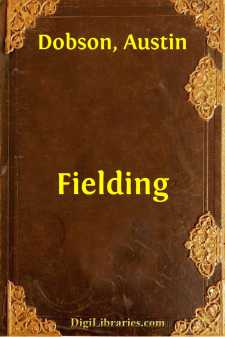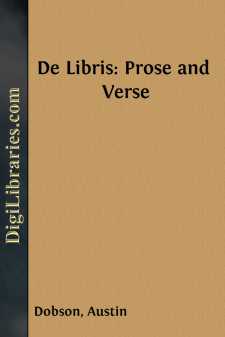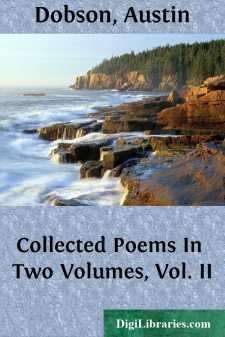Categories
- Antiques & Collectibles 13
- Architecture 36
- Art 48
- Bibles 22
- Biography & Autobiography 813
- Body, Mind & Spirit 142
- Business & Economics 28
- Children's Books 14
- Children's Fiction 11
- Computers 4
- Cooking 94
- Crafts & Hobbies 4
- Drama 346
- Education 46
- Family & Relationships 57
- Fiction 11829
- Games 19
- Gardening 17
- Health & Fitness 34
- History 1377
- House & Home 1
- Humor 147
- Juvenile Fiction 1873
- Juvenile Nonfiction 202
- Language Arts & Disciplines 88
- Law 16
- Literary Collections 686
- Literary Criticism 179
- Mathematics 13
- Medical 41
- Music 40
- Nature 179
- Non-Classifiable 1768
- Performing Arts 7
- Periodicals 1453
- Philosophy 64
- Photography 2
- Poetry 896
- Political Science 203
- Psychology 42
- Reference 154
- Religion 513
- Science 126
- Self-Help 84
- Social Science 81
- Sports & Recreation 34
- Study Aids 3
- Technology & Engineering 59
- Transportation 23
- Travel 463
- True Crime 29
Fielding
by: Austin Dobson
Categories:
Description:
Excerpt
EARLY YEARS—FIRST PLAYS.
Like his contemporary Smollett, Henry Fielding came of an ancient family, and might, in his Horatian moods, have traced his origin to Inachus. The lineage of the house of Denbigh, as given in Burke, fully justifies the splendid but sufficiently quoted eulogy of Gibbon. From that first Jeffrey of Hapsburgh, who came to England, temp. Henry III., and assumed the name of Fieldeng, or Filding, "from his father's pretensions to the dominions of Lauffenbourg and Rinfilding," the future novelist could boast a long line of illustrious ancestors. There was a Sir William Feilding killed at Tewkesbury, and a Sir Everard who commanded at Stoke. Another Sir William, a staunch Royalist, was created Earl of Denbigh, and died in fighting King Charles's battles. Of his two sons, the elder, Basil, who succeeded to the title, was a Parliamentarian, and served at Edgehill under Essex. George, his second son, was raised to the peerage of Ireland as Viscount Callan, with succession to the earldom of Desmond; and from this, the younger branch of the Denbigh family, Henry Fielding directly descended. The Earl of Desmond's fifth son, John, entered the Church, becoming Canon of Salisbury and Chaplain to William III. By his wife Bridget, daughter of Scipio Cockain, Esq., of Somerset, he had three sons and three daughters. Edmund, the third son, was a soldier, who fought with distinction under Marlborough. When about the age of thirty, he married Sarah, daughter of Sir Henry Gould, Knt., of Sharpham Park, near Glastonbury, in Somerset, and one of the Judges of the King's Bench. These last were the parents of the novelist, who was born at Sharpham Park on the 22d of April 1707. One of Dr. John Fielding's nieces, it may here be added, married the first Duke of Kingston, becoming the mother of Lady Mary Pierrepont, afterwards Lady Mary Wortley Montagu, who was thus Henry Fielding's second cousin. She had, however, been born in 1689, and was consequently some years his senior.
According to a pedigree given in Nichols (History and Antiquities of the County of Leicester), Edmund Fielding was only a lieutenant when he married; and it is even not improbable (as Mr. Keightley conjectures from the nearly secret union of Lieutenant Booth and Amelia in the later novel) that the match may have been a stolen one. At all events, the bride continued to reside at her father's house; and the fact that Sir Henry Gould, by his will made in March 1706, left his daughter L3000, which was to be invested "in the purchase either of a Church or Colledge lease, or of lands of Inheritance," for her sole use, her husband having "nothing to doe with it," would seem (as Mr. Keightley suggests) to indicate a distrust of his military, and possibly impecunious, son-in-law. This money, it is also important to remember, was to come to her children at her death. Sir Henry Gould did not long survive the making of his will, and died in March 1710. [Footnote: Mr. Keightley, who seems to have seen the will, dates it—doubtless by a slip of the pen—May 1708....




